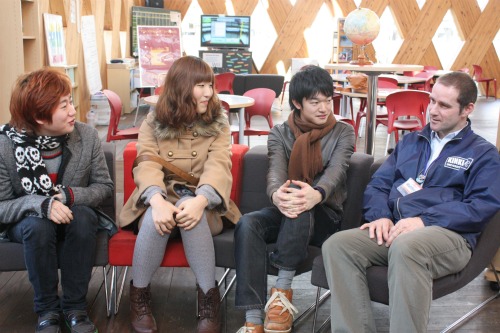This article is part 1 of 2 of the series ‘Programs for International Students at Japanese Universities’ of the CNU Press and Broadcasting Overseas Coverage Team sent to three Japanese universities last January 2012 for its Special Winter Coverage. – Ed.
There’s no such thing as a free lunch. Studying abroad has its own conditions and for those who are ready to accept, a huge door is open for them. Japan is no exception in the competition to attract more foreign students. “Never were international students a burden to Japanese universities—their entrance provides more opportunities for the universities to grow”, a Japanese university official said. What are the effects of having foreign students on campus? What are the indications that this is clearly not an impulsive action but a secured venture?
Risky Path for Japan
Starting in 1983, the former Nakasone administration planned to accept 100,000 foreign students. Since then the number of foreign students in Japan has increased by roughly ten times that amount and it has been successful. A total of 118,498 students entered Japan in the early part of the 21st century. “Doshisha has been a symbol for internationalization amongst Japanese universities, and this know-how was passed on to other universities in Japan. With the knowledge that these students bring forth positive changes at the university such as uplifting the liberal soul of students, internationalization is one of the cornerstones of our university,” says Keiko Izukura, representative of Doshisha University. Besides, foreign students who had studied in Japan acquired advance knowledge and skills as well as the Japanese mutual spirit and professionalism, according to a study by Shao (2000). This was confirmed by officials from Kinki University. Dr. Naohiro Urasaki of Kinki University said that “cultural exchange between foreign and local students brings an understanding on different levels. Professionally each one gains some know-how, socially they expand their networks and most importantly understanding is fortified.” The boom of international students in Japan was a recipe for success.


Global Competition
Japan is experiencing a steady influx of foreign students in the country due to the 1983 plan. At the moment, 5 percent of all international students all over the world have chosen Japan. However, Japan wants to retain its foreign students on its shores after graduation, or at least introduce to them a way to be employed in Japan for two main reasons: loss of Japanese high school graduates interested in higher education, and more alarmingly is the ageing population of Japan.
The playing field now becomes different for the Japanese—programs are still quantity oriented but more focused on attracting high-caliber international students to support its professional sector after graduation. “While foreign students at our university provide positive effects, there is a need to maintain high standards in the screening selection to secure continuous quality foreign students applications in the future” says Toshiyuki Kado, coordinator of international students in Kinki University.


A Long-term Investment for South Korea
“Never was I considered to be the same, I was always coined as ‘the foreigner’ which turns out to be quite alienating most of the time” says a foreign student in Chonnam National University (CNU), quite different from the experience of international students in Japan. “The Japanese consider foreign students to be part of them, regarding them not as waegukin (foreign student) but as ‘our students’” says Na Min-ji (Senior, Department of Mass Communication), currently an exchange student to Osaka University. “They are our students” adds Mr. Kado of Kinki University.
South Korean universities’ experiences with foreign students are still young—they should learn from the experience of Japanese universities who have been reaping the effects of it after years of investment in foreign students. As intellectual elite, those students are serving as social and economic stimuli wherever they are, all thanks to Japanese education. In short, an effective program for international students (more support, a conducive educational environment, and an understanding student community) had turned out to be soft power for Japan. Years after, Japan has secured its high position amongst countries all over the world as a country of good education, fit for international students. Similarly, Professor Shin Gyeong-gu Shin, Dean of International Affairs Office at CNU believes that “every international student who enters CNU is equivalent to three CNU students going abroad.” In the craze to secure national branding in South Korea and a savvy to reach acclaimed ‘international standards’ by Korean universities, improving the programs for foreign students is definitely a long-term investment to look upon.
By Rigoberto Banta Jr., Student Editor
[Feature]
Rigoberto Banta Jr. 기자
-

